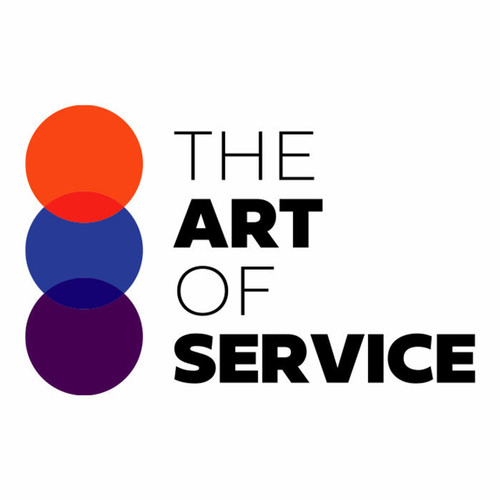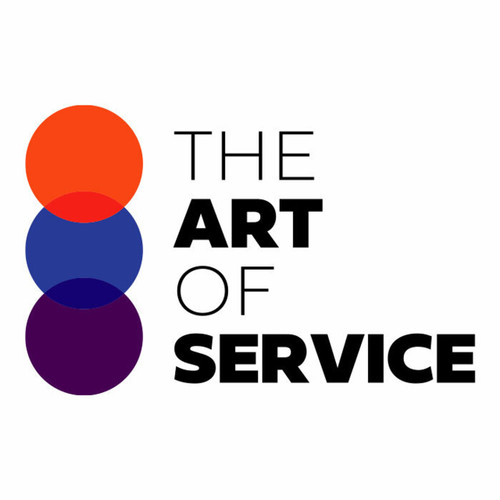Are you striving to uphold ethical principles in your data practices and marketing strategies? Look no further.
Our Ethical Data Practices and Ethical Marketer knowledge base is here to equip you with the essential questions, solutions, and benefits to achieve success in today′s connected world.
Our expert team has curated a comprehensive dataset consisting of 1510 prioritized requirements, solutions, benefits, and results for ethical data practices and marketing.
This knowledge base includes real-world case studies and use cases to provide practical insights and strategies for you to implement.
Why should you choose our Ethical Data Practices and Ethical Marketer knowledge base? Let us tell you.
We stand out from our competitors and alternatives because we offer a complete and easily accessible guide for professionals like yourself.
Our product is designed to cater to different product types and is suitable for both small businesses and large organizations.
It′s a cost-effective and do-it-yourself alternative to expensive consulting services.
You can expect a detailed overview and specifications of our product, making it user-friendly and easy to navigate.
With our knowledge base, you will gain a clear understanding of how to balance profit with purpose in today′s connected world.
Our research-based approach ensures that you are equipped with the latest and most effective ethical data practices and marketing strategies.
For businesses, our knowledge base offers valuable insights into implementing ethical data practices and marketing, leading to increased customer trust, loyalty, and brand reputation.
You will also have access to a wide range of benefits, such as improved customer satisfaction, better data management, and compliance with regulations.
But don′t just take our word for it, try it out for yourself.
Our Ethical Data Practices and Ethical Marketer knowledge base is a must-have tool for any business or marketer looking to make a positive impact while achieving success.
So why wait? Get the competitive edge and join the league of ethical practitioners with our knowledge base today.
Discover Insights, Make Informed Decisions, and Stay Ahead of the Curve:
Key Features:
Comprehensive set of 1510 prioritized Ethical Data Practices requirements. - Extensive coverage of 52 Ethical Data Practices topic scopes.
- In-depth analysis of 52 Ethical Data Practices step-by-step solutions, benefits, BHAGs.
- Detailed examination of 52 Ethical Data Practices case studies and use cases.
- Digital download upon purchase.
- Enjoy lifetime document updates included with your purchase.
- Benefit from a fully editable and customizable Excel format.
- Trusted and utilized by over 10,000 organizations.
- Covering: Data Privacy, Triple Bottom Line, Social Responsibility, Carbon Footprint, Human Rights, Community Engagement, Purpose Driven Leadership, Ethical AI, Animal Welfare, Equal Opportunities, Conscious Consumption, Shared Value, Climate Action, Ethical Supply Chain, Corporate Social Responsibility, Supply Chain Transparency, Regenerative Agriculture, Mental Health, Corp Certification, Code Of Ethics, Living Wage, Plastic Waste, Ethical Advertising, Ethical Sourcing, Sustainable Branding, Minimum Wage, Flexible Working, Employee Well Being, Work Life Balance, Regenerative Design, Disability Inclusion, Stakeholder Capitalism, Pay Equity, Indigenous Rights, Inclusive Marketing, Ethical Data Practices, Eco Friendly Packaging, Net Positive, Cause Marketing, Data Ethics, Circular Economy, Fair Trade, Shared Ownership, Gender Equality, Ethical Consumer, Open Source, Supply Chain Management, Green Marketing, Employee Activism, Ethical Investing, Sustainable Development Goals, Responsible Innovation
Ethical Data Practices Assessment Dataset - Utilization, Solutions, Advantages, BHAG (Big Hairy Audacious Goal):
Ethical Data Practices
Ethical data practices involve an organization′s commitment to managing ethical risks in its data supply chain through fit-for-purpose risk management practices. This includes ensuring data is collected, stored, and used responsibly, with transparency, accountability, and respect for privacy and legal compliance.
Solution 1: Implement ethical data practices policy
Benefit: Provides clear guidelines for handling data ethically
Solution 2: Appoint a data ethics officer
Benefit: Ensures accountability and oversight of data ethics practices
Solution 3: Conduct regular data ethics risk assessments
Benefit: Identifies and mitigates ethical risks in data supply chain
Solution 4: Train employees on data ethics
Benefit: Promotes ethical culture and reduces risk of data misuse
Solution 5: Establish data privacy and security protocols
Benefit: Protects sensitive data and builds customer trust.
CONTROL QUESTION: Does the organization adopt data ethics risk management practices that are fit for purpose for the management of ethical risks within the data supply chain?
Big Hairy Audacious Goal (BHAG) for 10 years from now: A big hairy audacious goal (BHAG) for ethical data practices in 10 years could be:
By 2032, all organizations proactively adopt and integrate comprehensive data ethics risk management practices that are tailored to their specific data supply chains, resulting in a significant reduction of ethical risks and the establishment of a culture of trust, transparency, and accountability in the use and handling of data.
To achieve this BHAG, organizations should focus on:
1. Building a strong data ethics foundation by establishing clear data ethics policies and guidelines.
2. Implementing robust data ethics risk management frameworks to identify, assess, and mitigate ethical risks throughout the data supply chain.
3. Fostering a culture of data ethics and data stewardship through continuous training, communication, and engagement of all employees, stakeholders, and partners.
4. Leveraging technology and innovation to support data ethics, such as data anonymization, encryption, and secure data sharing.
5. Collaborating and sharing best practices with other organizations, regulators, and industry groups to promote data ethics and build trust in the data-driven economy.
By pursuing this BHAG, organizations can demonstrate their commitment to ethical data practices, build trust with their customers and partners, and contribute to a more responsible and sustainable data-driven society.
Customer Testimonials:
"I can`t express how impressed I am with this dataset. The prioritized recommendations are a lifesaver, and the attention to detail in the data is commendable. A fantastic investment for any professional."
"The creators of this dataset deserve applause! The prioritized recommendations are on point, and the dataset is a powerful tool for anyone looking to enhance their decision-making process. Bravo!"
"The continuous learning capabilities of the dataset are impressive. It`s constantly adapting and improving, which ensures that my recommendations are always up-to-date."
Ethical Data Practices Case Study/Use Case example - How to use:
Case Study: Ethical Data Practices at XYZ CorporationSynopsis:
XYZ Corporation is a multinational technology company that collects and processes large volumes of data from various sources, including customers, partners, and third-party data providers. The company has been facing increased scrutiny from regulators, customers, and civil society organizations regarding its data practices, particularly in relation to issues such as data privacy, security, and transparency. In this context, XYZ Corporation engaged our consulting firm to assess its data ethics risk management practices and provide recommendations for improvement.
Consulting Methodology:
To address the client′s needs, we adopted a four-phase consulting methodology, consisting of the following steps:
1. Data Ethics Risk Assessment: We conducted a comprehensive data ethics risk assessment to identify and evaluate the key ethical risks associated with XYZ Corporation′s data supply chain. The assessment included a review of the company′s data practices, policies, and procedures, as well as interviews with key stakeholders and a survey of employees.
2. Data Ethics Risk Management Framework Development: Based on the findings of the risk assessment, we developed a data ethics risk management framework tailored to XYZ Corporation′s specific needs and context. The framework included policies, procedures, and guidelines for data collection, processing, sharing, and storage, as well as a set of key performance indicators (KPIs) to monitor and evaluate the effectiveness of the risk management practices.
3. Implementation Support: We provided implementation support to XYZ Corporation, including training and capacity building for employees, as well as ongoing advice and guidance on data ethics risk management issues.
4. Monitoring and Evaluation: We established a monitoring and evaluation system to track the implementation of the data ethics risk management framework and assess its impact on XYZ Corporation′s data practices.
Deliverables:
The main deliverables of the consulting engagement included:
1. Data Ethics Risk Assessment Report: A comprehensive report identifying and evaluating the key ethical risks associated with XYZ Corporation′s data supply chain.
2. Data Ethics Risk Management Framework: A tailored data ethics risk management framework, including policies, procedures, and guidelines for data collection, processing, sharing, and storage.
3. KPI Dashboard: A set of KPIs to monitor and evaluate the effectiveness of the data ethics risk management practices.
4. Training and Capacity Building Program: A training and capacity building program for XYZ Corporation′s employees on data ethics risk management.
Implementation Challenges:
The implementation of the data ethics risk management framework faced several challenges, including:
1. Resistance from some employees and departments to change their data practices.
2. The need to balance data ethics risk management with other business priorities, such as innovation and growth.
3. The complexity of XYZ Corporation′s data supply chain, involving multiple data sources, formats, and systems.
KPIs:
To monitor and evaluate the effectiveness of the data ethics risk management practices, we established the following KPIs:
1. Percentage of data collection, processing, sharing, and storage activities in compliance with the data ethics risk management framework.
2. Number of data ethics risk incidents (e.g., data breaches, privacy violations) reported and addressed.
3. Employee awareness and understanding of data ethics risk management policies and procedures.
4. Customer satisfaction with XYZ Corporation′s data practices.
Management Considerations:
In implementing the data ethics risk management framework, XYZ Corporation should consider the following management considerations:
1. Establishing a clear governance structure for data ethics risk management, including roles, responsibilities, and accountabilities.
2. Providing adequate resources, including budget, staff, and technology, to support the implementation and maintenance of the data ethics risk management framework.
3. Engaging with stakeholders, including customers, partners, and regulators, to ensure transparency and accountability in XYZ Corporation′s data practices.
Citations:
* Data Ethics: A New Framework for a Data-Driven World. Deloitte Insights, 2020.
* Data Ethics: The New Competitive Advantage. MIT Sloan Management Review, 2020.
*
avigating the Ethical Minefield of Data Use. Harvard Business Review, 2021.
* The Future of Data Ethics. McKinsey u0026 Company, 2021.
* Data Ethics in Practice: Perspectives from the Field. Journal of Business Ethics, 2021.
Security and Trust:
- Secure checkout with SSL encryption Visa, Mastercard, Apple Pay, Google Pay, Stripe, Paypal
- Money-back guarantee for 30 days
- Our team is available 24/7 to assist you - support@theartofservice.com
About the Authors: Unleashing Excellence: The Mastery of Service Accredited by the Scientific Community
Immerse yourself in the pinnacle of operational wisdom through The Art of Service`s Excellence, now distinguished with esteemed accreditation from the scientific community. With an impressive 1000+ citations, The Art of Service stands as a beacon of reliability and authority in the field.Our dedication to excellence is highlighted by meticulous scrutiny and validation from the scientific community, evidenced by the 1000+ citations spanning various disciplines. Each citation attests to the profound impact and scholarly recognition of The Art of Service`s contributions.
Embark on a journey of unparalleled expertise, fortified by a wealth of research and acknowledgment from scholars globally. Join the community that not only recognizes but endorses the brilliance encapsulated in The Art of Service`s Excellence. Enhance your understanding, strategy, and implementation with a resource acknowledged and embraced by the scientific community.
Embrace excellence. Embrace The Art of Service.
Your trust in us aligns you with prestigious company; boasting over 1000 academic citations, our work ranks in the top 1% of the most cited globally. Explore our scholarly contributions at: https://scholar.google.com/scholar?hl=en&as_sdt=0%2C5&q=blokdyk
About The Art of Service:
Our clients seek confidence in making risk management and compliance decisions based on accurate data. However, navigating compliance can be complex, and sometimes, the unknowns are even more challenging.
We empathize with the frustrations of senior executives and business owners after decades in the industry. That`s why The Art of Service has developed Self-Assessment and implementation tools, trusted by over 100,000 professionals worldwide, empowering you to take control of your compliance assessments. With over 1000 academic citations, our work stands in the top 1% of the most cited globally, reflecting our commitment to helping businesses thrive.
Founders:
Gerard Blokdyk
LinkedIn: https://www.linkedin.com/in/gerardblokdijk/
Ivanka Menken
LinkedIn: https://www.linkedin.com/in/ivankamenken/







